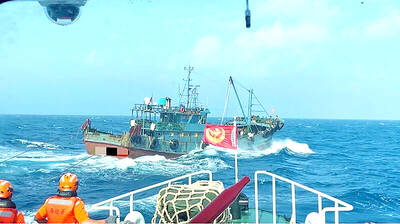Lawmakers from across party lines yesterday proposed amending the law to allow foreign doctors to provide medical treatment in Taiwan if necessary -- a move aimed at helping former president Lee Teng-hui (
In an effort to bring to an end an incident that has disturbed relations between Taiwan, Japan and China, and out of humanitarian concern to solve Lee's medical problems, lawmakers raised the idea of amending current law to let foreign doctors practice in Taiwan. Under the Physicians' Law (醫師法), only the holders of licenses issued by Taiwan's government may practice medicine here.
"If the Japanese government insists on not issuing former president Lee a visa, the only solution would be for Japanese doctors to come to Taiwan," said KMT lawmaker Liu Kuang-hua (
Endorsing Liu's views, People First Party lawmaker Hwang Yih-jiau (黃義交) said that given Taiwan's disadvantaged standing in the international community, both incumbent and former presidents were effectively "grounded" in Taiwan because of pressure from China.
Hwang argued that medical expertise and specialization may vary from country to country and therefore, to prevent political factors from affecting the health of presidents, existing law should be amended.
To guarantee the right to medical treatment of both presidents and civilians, lawmakers suggested revising two stipulations -- the regulations for the treatment of former presidents, and those governing medical practice by foreign doctors.
In addition to benefits including salary, transportation, and housing enjoyed by former presidents, lawmakers suggested adding another stipulation to allow, with the approval of the Department of Health, former presidents and vice presidents to invite foreign doctors to come to Taiwan to provide them with medical treatment.
To uphold the medical rights of civilians, lawmakers also proposed adding another regulation, to the effect that in the case of a medical emergency which local medical skills and facilities are inadequate to handle, a foreign doctor may provide medical treatment in Taiwan upon obtaining special permission from the health department and an invitation from a local hospital.
Meanwhile, there have been conflicting responses to the question of whether Mitsudo Kazuaki, the doctor Lee plans to see in Japan for a follow-up examination, performed Lee's heart operation at National Taiwan University Hospital in November. Lee said at a press conference on Sunday that Kazuaki was the only person who knew where his five stents -- a device for dilating narrowed coronary arteries -- had been placed, implying that it was indeed the Japanese surgeon who performed the operation. The hospital said Kazuaki merely "supervised" the operation.

POLITICAL AGENDA: Beijing’s cross-strait Mid-Autumn Festival events are part of a ‘cultural united front’ aimed at promoting unification with Taiwan, academics said Local authorities in China have been inviting Taiwanese to participate in cross-strait Mid-Autumn Festival celebrations centered around ideals of “family and nation,” a move Taiwanese academics said politicizes the holiday to promote the idea of “one family” across the Taiwan Strait. Sources said that China’s Fujian Provincial Government is organizing about 20 cross-strait-themed events in cities including Quanzhou, Nanping, Sanming and Zhangzhou. In Zhangzhou, a festival scheduled for Wednesday is to showcase Minnan-language songs and budaixi (布袋戲) glove puppetry to highlight cultural similarities between Taiwan and the region. Elsewhere, Jiangsu Province is hosting more than 10 similar celebrations in Taizhou, Changzhou, Suzhou,

COGNITIVE WARFARE: Chinese fishing boats transmitting fake identification signals are meant to test Taiwan’s responses to different kinds of perceived incursions, a report said Chinese vessels are transmitting fake signals in Taiwan’s waters as a form of cognitive warfare, testing Taipei’s responses to various types of incursions, a report by the Institute for the Study of War said on Friday. Several Chinese fishing vessels transmitted fake automatic identification system (AIS) signals in Taiwan’s waters last month, with one mimicking a Russian warship and another impersonating a Chinese law enforcement vessel, the report said. Citing data from Starboard Maritime Intelligence, the report said that throughout August and last month, the Chinese fishing boat Minshiyu 06718 (閩獅漁06718) sailed through the Taiwan Strait while intermittently transmitting its own AIS

CHINESE INFILTRATION: Medical logistics is a lifeline during wartime and the reported CCP links of a major logistics company present a national security threat, an expert said The government would bolster its security check system to prevent China from infiltrating the nation’s medical cold chain, a national security official said yesterday. The official, who wished to stay anonymous, made the remarks after the Chinese-language magazine Mirror Media (鏡周刊) reported that Pharma Logistics (嘉里醫藥物流) is in charge of the medical logistics of about half of the nation’s major hospitals, including National Taiwan University Hospital and Taipei Veterans General Hospital. The company’s parent, Kerry TJ Logistics Co (嘉里大榮物流), is associated with the National Committee of the Chinese People’s Political Consultative Conference (CPPCC) and the Chinese People’s Liberation Army (PLA), the

COVETED PRIZE: The US president would be a peace prize laureate should he persuade Xi Jinping to abandon military aggression against Taiwan, William Lai said US President Donald Trump should get the Nobel Peace Prize should he be able to convince Chinese President Xi Jinping (習近平) to abandon the use of force against Taiwan, President William Lai (賴清德) told a conservative US radio show and podcast in an interview. The US is Taiwan’s most important international backer, despite the absence of formal ties, but since Trump took office earlier this year he has not announced any new arms sales to the nation. Trump could meet Xi at the APEC summit in South Korea on Oct. 31 and Nov. 1. Lai, speaking on The Clay Travis and Buck Sexton